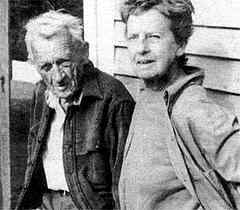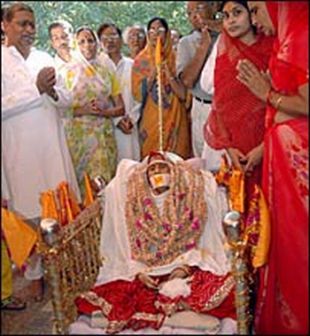Santhara - an alternative
 Santhara, or
Sallekhana, is the
Jain
religious ritual of voluntary death by
fasting.
Supporters of the practice believe that Santhara cannot be considered
suicide,
but rather something one does with full knowledge and intent, while suicide
is viewed as emotional and hasty. Due to the prolonged nature of Santhara,
the individual is given ample time to reflect on his or her
life. The vow
of Santhara is taken when one feels that one's life has served its purpose.
More from Wikipedia. See
Sallekhana below.
Santhara, or
Sallekhana, is the
Jain
religious ritual of voluntary death by
fasting.
Supporters of the practice believe that Santhara cannot be considered
suicide,
but rather something one does with full knowledge and intent, while suicide
is viewed as emotional and hasty. Due to the prolonged nature of Santhara,
the individual is given ample time to reflect on his or her
life. The vow
of Santhara is taken when one feels that one's life has served its purpose.
More from Wikipedia. See
Sallekhana below.
Ahdel - DC's mother - a textbook case
Niels Holm passed this way
How long can we live without water?
Some of the best entries here are down toward the bottom.
11-03-14 - Spokeswoman for death with dignity ends life
Santhara - a Jain ceremony of death with dignity through ceasing to eat and drink - the natural, traditional method that takes into account the importance of state of mind, death as a transition.
8-12-13 -A day with no work is a day with no food. According to the story as I recall it, Baizhang_Huaihai [Hyakujō Ekai) (720–814)] stopped eating when his disciples took his gardening tools away. Then they begged him to teach them and he said - OK, for one more year. He did that, then since he was too old to work, he stopped eating and died. I think I've got that right. Would appreciate link to or copy of that story to add it to the Santhara section of cuke. Go there and see why. Check down to the page for the Scott Nearing story, a modern version of this natural and traditional death with dignity method - stopping eating and drinking. - dc
7-31-13 - I'm unclear on the right to die cases reported on BBC today. Can't they just stop intake? stop eating and drinking or being nourished intravenously? Is there an assumption here that they want to be given a lethal shot or is the British government prohibiting them from turning off their support? - dc
2-18-12 - Remembering Ananda Claude Dalenberg, Ananda chose this death with dignity naturally.
7-17-11 - You Don't Know Jack, Euthanasia, Suicide in Pali Scripture - from Bro Lor in the Santhara section
Suicide in Pali scripture - a slightly longer version of what Loring quoted from Peter Masefield's Divine Revelation in Pali Buddhism with the Pali sources marked.
Expedited getting this up because I ran into
Katy Butler at the
Fire Monks special kick-off event
at the SFZC's City Center on Thursday.
Katy's article, Discussing her popular article in the New York Times
Magazine,
My Father's Broken
Heart/Slow Medicine, is what got us into talking about Santhara.
6-04-11 - Jack Kevorkian died yesterday.
Reflections on Jack Kevorkian: Who Owns Death? by Janice M. Van Dyck from Huff Post
Posted in this cuke Santhara section - Santhara, the traditional, natural way of death with dignity. In India recently I read that everyday someone in a terminal state takes this Jain vow of Santhara to cease eating and drinking. Of course, with over a billion people, that means that it's rarely done as a Jain ceremony - a few hundred times a year. In actuality I would imaging it's done a few hundred or maybe a thousand or more times a day - there where about 25,000 people die every day The Santhara section was started the day Kevorkian got out of prison to highlight an alternative to his method of death with dignity.
I enjoyed the movie on him starring Al Pacino and respect him, what he did, and think it's everyone's right to end their life anytime they want, especially if they're in a hopeless, painful, terminal state. But to me his method is rash. Kevorkian saw assisting death through the cessation of food and liquid as torture, something the Nazis did. I talked with a few friends experienced in Hospice work, and whereas they respected the Kevorkian decision, they also respected the Santhara method and said it did not need to be overly painful if done correctly, for instance, by keeping the mouth moist. More on the details later, but one last comment is that to me, the Kevorkian method is not ideal if one views death as a transition of great importance. - dc
9-28-09 - RIP Lady Jane, Katrinka's companion of 13 years and Clay's and mine as well of 5. She was a big old dog. One woman observer called her an Anatolian Guard Dog. She slept more and more these last few years and recently it's become harder and harder for her to get up the stairs. She fell down them a couple of times and stayed down a lot. Then a few days ago she stopped eating then drinking and then she went over to the front of John's house and crawled under a bush and died there within a day. An excellent example to us all. This memorial filed under Family and Santhara (the natural, traditional way of death with dignity). Here's a photo of her minus the end of her nose.
Thanks so much to Rachel Boughton
who wrote, "John told me that Lady Jane went to the happy hunting grounds
last night, moved on to her next incarnation, threw off this mortal coil.
She was a dear old lady, bless her heart. I'll miss her. Best wishes to
her on her journey and to you, too.
love,
Rachel
9-24-09 - BBC: An Australian quadriplegic, who last month won a landmark legal right to starve to death, has died.
3-17-08 - I think of Santhara when I read sad news like this. Naively I guess, I think she should meditate and wake up to the big self, big mind - but if she wants to die, she doesn't have to get permission or take an overdose of drugs, she merely has to stop eating and drinking and she will die in a week or so.
6-18-07 - The death of U. G. Krishnamurti, an example of Santhara.
6-12-07 - Death of a Sadhu - from bro Loring
More Santhara comments from Loring [see previous emails between Loring and DC below] I've got to reorganize Loring's emails into a more logical order. Later. - DC
 6-11-07
-
6-11-07
-
At
The End Of A Good Life
Scott Nearing's dignified death, like his life,
sets an inspiring example for all of us
by Helen Nearing
Another example of Santhara
Sallekhana, from Wikipedia. This entry, as they note, ought to be merged with their entry for Santhara. No need to go there - I've put it all below. There are some important points made clear here not in the Santhara entry.
Sallekhana (also Santhara, Samadhi-marana, Samnyasa-marana) is a Jain practise of voluntary death through fasting when the end of life is very near due to unavoidable circumstances, such as illness or old age. It is the act of calmly withdrawning from worldly preoccupations and attachments by a combination of meditation and abstaining from food and water. In accepting to do sallekhana, the person must take a special vow to ensure that the body and the soul will leave the world in harmony and complete peace of mind, without fear. The purpose is to purge old karmas and prevent the creation of new ones.
This is from an article called Sallekhana in Jainworld.com, by Justic T. K. Tukol, L.D. Institute. This is Lessons for Seniors(15)
Sallekhana vs. suicide
Like most Dharmic religious traditions, Jainism considers suicide a wrong that only retains the karma from the current life and does not allow escape from the cycle of births and rebirths. Suicide involves an intentional act of harm against oneself with a known outcome that negatively affects those left behind. With Sallekhana, death is welcomed through a peaceful, tranquil process providing peace of mind for everyone involved.
From the Ontario Multifaith Council's Journal of Spiritual and Religious Care, article called Sallekhana versus Suicide. Link didn't work - http://www.omni.omc.ca/archives/000036.html.
6-10-07 -
from India Traveler.blogspot.com -
SANTHARA : The Ritual of fasting unto death voluntarily by
ones own free will. Also billed as
SANTHARA : To Die Voluntarily by ones own
choice: Jainism in INDIA. Photos and video. Thanks
to Loring for this.
6-04-07 - I like the word Santhara. I thought it would be better to call it something more gentle than suicide like, "ceasing to eat," and there's also "ceasing to drink." And it's better than self-starvation. Not talking about behavior caused by eating disorders, other psychological problems, or some physical problem.
It seems to me that, for those who wish for their own good reasons to pass on, this is a far better method than the Kevorkian or other quick and, to me, violent methods. I think it is traditional and not hasty. Also, I have gathered from discussing this with hospice workers and just people here and there, that this is a method that naturally occurs to people to follow. Sometimes it is suggested to those who are dying and don't want to interfere with the process any more. I have heard newscasters call starvation hideous and painful but from my experience with fasting it is pleasant. I, and others whom I've talked to, have found that the first three days of a fast are the hardest and then the hunger tends to go away. For a healthy person it can take months to die from not eating but for ill people it can be much quicker. But I don't know that much about dying and sick people so I want to hear what others think.
Martha de Barros (formerly Freebairn-Smith) who has extensive experience with hospice work says that fasting without including liquids can be painful, difficult, and cause complications. But to my surprise, she said that stopping the intake of fluids as well is not particularly painful, and fasting this way can reduce suffering. She said the dying person only needs to have water sprayed on their lips and that that pretty much eliminates thirst. Really? Wow. Others I've run this through say they've used ice cubes.
I'm just starting a discussion here and realize that I know very little about it. But it seems to me that there's lots of talk and media about taking drugs to end one's life in assisted suicide but approaching zero talk about cutting off food and/or water. First I'd like to investigate the subject and, if it holds up as a good way to go, then I think it should be something that people are aware of, something that's discussed, something that occurs as prominently as quicker methods to a dying person who wants to hasten their demise.
Some might wonder why would a slower method be better? Isn't it better that a person be put out of their misery? I don't believe in that, often not even for animals. To me death is a transitional state and the quality of the transition of a quantum degree more important than escaping pain. I do not see death as an end to pain and suffering, but as an opportunity for awakening. I saw things this way before I was aware of the Tibetan Book of the Dead or later, the Tibetan Book of Living and Dying. I see life and death as the "daiji," the great matter, and think it best to ease into death.
I remember talking to my mother (93 and in terrific health) about self-starvation as a possible assist to a prolonged and unrewarding demise. At first she had a negative sort of shocked response like that was not a good thing to say but then she had a change of heart when she remembered two friends who'd done that. Just stopped eating and then stopped drinking. Better she agreed, even in the case of our dear friend Evan, one of my father's best friends, who wasn't dying but became depressed in his widowered old age and shot himself.
In march, I wrote about the death of two friends' of Clays in which I considered death, dying, how to be with the bodies of those who've passed, and mentioned it would be good to have suggestions on What to Do Before the Funeral.
Loring Palmer answered with this email on Joan Halifax and death and dying.
DC response to Loring's Letter in which ceasing to eat and/or drink as a gentle way to assist death is brought up.
Loring back to DC - wherein he introduces the concept of Santhara. Just what I'd been looking for.
With more on Joan H., Loring response to
Dchad quick response to Loring
Loring on sending something to DC on Buddha on Suicide - DC has to look for it to post.
 An
India Daily article on a case of Santhara that clearly falls within the
scope of what we're talking about here.
An
India Daily article on a case of Santhara that clearly falls within the
scope of what we're talking about here.
Felo de se Home
Zen Aluminati What's New